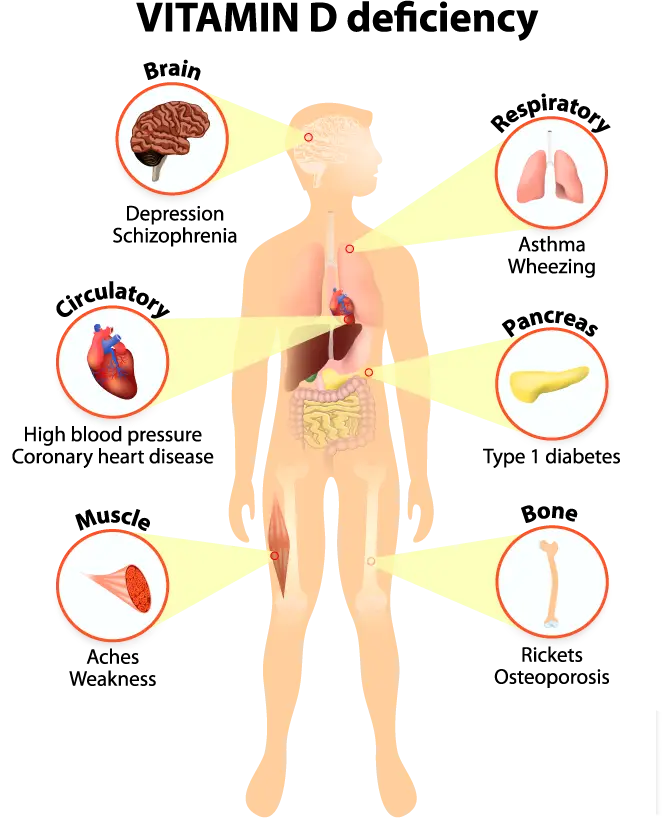Tests Included (1)
- 25-OH VITAMIN D (TOTAL)
What is a 25-OH Vitamin D (Total) test?
A blood test that determines the amount of vitamin D in your blood is the 25-OH Vitamin D (Total) test. It evaluates the blood's primary form of vitamin D, 25-hydroxyvitamin D, and uses it to determine a person's vitamin D status.
What does 25-OH Vitamin D (Total) test measure?
This test measures the blood level of 25-hydroxyvitamin D, which is crucial for determining and tracking each person's vitamin D status. Calcium, phosphorus, and magnesium levels in the blood must be regulated by vitamin D in order to maintain healthy bones and perform a number of physiological processes.
What is a 25-OH Vitamin D (Total) test?
The 25-OH Vitamin D (Total) test is a blood test that measures the level of vitamin D in your blood. It assesses the concentration of 25-hydroxyvitamin D, which is the major form of vitamin D found in the blood and serves as an indicator of vitamin D status.
What does 25-OH Vitamin D (Total) test measure?
This test measures the amount of 25-hydroxyvitamin D in the blood, which is essential for assessing and monitoring vitamin D levels in individuals. Vitamin D plays a crucial role in regulating blood levels of calcium, phosphorus, and magnesium, which are essential for bone health and various physiological functions.
Benefits of 25-OH Vitamin D (Total) test
- Evaluation of Vitamin D Status: Assists in determining your body's vitamin D levels, which are essential for healthy bones and general wellbeing.
- Determination of Deficiency or Excess: This test looks for vitamin D shortages or excesses that could affect bone mineralization and other physiological processes.
- Advice on Supplementation: Based on test findings, this section offers recommendations for the right amount of vitamin D to take in order to maintain optimal bone health.
- Prevention of Bone Diseases: Aids in preventing diseases linked to vitamin D insufficiency, such as rickets in children and osteomalacia in adults.
- Enhancement of Immune Function: Sufficient amounts of vitamin D maintain a robust immune system and lower the incidence of autoimmune diseases.
- Reduced Cancer chance: Keeping vitamin D levels at their ideal levels may help to reduce the chance of developing several types of cancer.
- Individualized Health Management: Personalized dietary or lifestyle changes based on vitamin D status are made possible by individualized health management.
- Monitoring for High-Risk Individuals: This is crucial for people who are more likely to experience deficiencies, including the elderly, obese people, people with darker skin tones, and people with little or no sun exposure.
FAQ's
1. How long will it take to receive my 25-OH Vitamin D (Total) test results?
Answer: You will receive your test reports via SMS and Email from Dr Lal PathLabs Health within 24 to 48 hours after the sample collection.
2. What is the process for collecting a sample for the 25-OH Vitamin D (Total) test?
Answer: Once you place an order, our team will contact you on your registered number to confirm the details. A payment link will then be sent to you, and upon payment confirmation, a trained and vaccinated Medic from Dr Lal PathLabs Health will visit your location at the scheduled time for sample collection.
3. When is the best time to schedule a 25-OH Vitamin D (Total) test?
Answer: Since the 25-OH Vitamin D (Total) test requires fasting, it is recommended to have the test done early in the morning after fasting for 10 to 12 hours. Avoid consuming anything except water during this fasting period.
Booking Procedure:
- Fill the booking form on right side with Name, Address, Mobile no.
- Blood/Urine samples will be collected from your Home address. 10-12 hrs fasting is required.
- You need to make the payment by cash to Thyrocare when Technician comes to pick up the samples OR Pay online after confirmation of booking.
- Reports will be couriered at your residence in 3-4 working days if hardcopy is opted. We will email the reports within 48-72 hrs on your email address mentioned while booking.
- Sample pickup at home
- Online reports within 48 hours

User Reviews
Please add your review
Similar test/profile
At Second Medic, we offer a comprehensive range of lab tests to help diagnose and monitor a wide variety of medical conditions. Our state-of-the-art laboratories are equipped with the latest technology and staffed by highly trained professionals, ensuring that our patients receive accurate and reliable results.
We offer a wide range of lab tests, including blood tests, urine tests, and other diagnostic tests. Our lab tests are designed to provide a comprehensive view of a patient's health, allowing us to detect and monitor medical conditions early on, and make informed treatment decisions.
We understand that lab tests can be stressful, which is why we strive to make the process as easy and comfortable as possible for our patients. Our team of friendly and compassionate professionals are always available to answer any questions or concerns that our patients may have.
At Second Medic, we are committed to providing the highest quality lab tests and personalized care to our patients. We believe that every patient is unique and deserves a personalized approach to their healthcare, and we work closely with our patients to develop individualized treatment plans that meet their specific needs.
If you are in need of lab tests, we invite you to schedule an appointment at one of our convenient locations today. Our team looks forward to serving you and helping you achieve optimal health and wellness.







